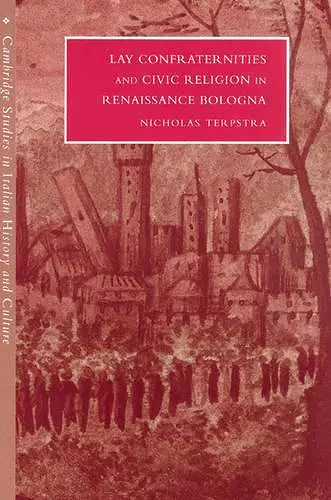Lay Confraternities and Civic Religion in Renaissance Bologna
Format:Paperback
Publisher:Cambridge University Press
Published:8th Aug '02
Currently unavailable, and unfortunately no date known when it will be back
This paperback is available in another edition too:
- Hardback£114.00(9780521480925)

An analysis of the social, political and religious role of confraternities in Renaissance Bologna, first published in 1995.
This 1995 book examines the confraternities, lay groups through which Italians of the Renaissance expressed their individual and collective religious beliefs. Intensely local and predominantly artisanal, the confraternities shaped the civic religious cult through charitable activities, public shrines and processions.This 1995 book analyses the social, political and religious roles of the confraternities - the lay groups through which Italians of the Renaissance expressed their individual and collective religious beliefs - in Bologna in the fifteenth and sixteenth centuries. These confraternities shaped the civic religious cult through charitable activities, public shrines and processions. This civic religious role expanded as the confraternities became politicised: patricians used the confraternities increasingly in order to control the civic religious cult, civic charity, and the city itself. The book examines in detail how confraternities initially provided laypeople of the artisanal and merchant classes with a means of expressing a religious life separate from, but not in opposition to, the local parish or mendicant house. By the mid-sixteenth century, artisans and merchants had few options beyond parochial confraternities which were controlled by parish priests.
"Nicholas Terpstra has written an excellent book, one that has been carefully crafted and researched to discover and analyze the interwoven strands of religion and society." James R. Banker, Journal of Modern History
"...significantly advances our understanding of the devotional and political context of premodern Italian cities, in this case Bologna....provides a new and revealing insight into the multiple patterns of spirituality, devotion, charity, and politics to be found in the Italian Renaissance....makes an invaluable contribution for its topic, its scholarship, and its city of interest." Canadian Journal of History
"Terpstra has done an impressive job of tracing the charitable and religious activities of the confraternities in the light of Bologna's continually changing political landscape." Timothy Fehler, Journal of Church and State
"The book reviewed here is a fine example of a wide-ranging and methodologically sophisticated inquiry into the nature and history of confraternities in an important Italian City....certain to interest students of society, religion, and poltics,,,.Terpstra skilfully guides the reader through the intricaies of confraternal forms of worship, ritual, organization, internal administration, finances and sources of wealth. The book's strength is its thorough grounding in primary sources....This book is a remarkable achievement. Impressively well informed about primary and secondary sources, learned, subtle, and thoughful, it weaves institutional, religious, and political history into a whole. It lets evidence speak without overwhelming the reader with tangential details....this is a work which opens fresh dimensions for all those in quest of understanding sixteenth-century Italy." Elisabeth Gleason, Sixteenth Century Journal
"Nicholas Terpstra's study of civic religion in Renaissance Bologna is a significant contribution to the growing body of literature on lay confraternities...." Daniel Bornstein, Speculum
ISBN: 9780521522618
Dimensions: 229mm x 152mm x 15mm
Weight: 400g
272 pages